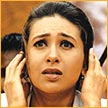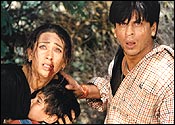
|
Who wears the pants?
Deepa Gahlot wonders whether woman-centric films really portray womanpower
|
Deepa Gahlot
Last week’s 'womanpower' releases Shakti and Gunaah flopped at the box-office and gave the Hindi film industry a chance to reiterate the myth that heroine-centric films do not work. That also gives them an excuse to underpay heroines and give them lesser parts.
But were these two (and other such) films really about woman power? That is debatable.
When our filmmakers make films with female protagonists, they do not want to disturb the status quo, they do not want to suggest that a real social change is possible, so that women’s individuality and rights are automatically respected. Sure, they are just films and not meant to be taken seriously, but indirectly, in a small way, films do help shape perceptions --- and many of our films project women in a damaging negative light.
|
|
In Shakti, the protagonist Nandini (Karisma Kapoor) is trapped in a feudal nightmare with her father-in-law Narsimha (Nana Patekar) ruling a violent male fiefdom in which the bejewelled women cower in fear. It is accepted that, in this world, women are as good as chattel. The filmmaker makes no judgment on that, but throughout Nandini is berated for her feminine ways --- her clothes, her squeamishness over their savage rituals and her protectiveness towards her husband and child. The father-in-law calls her 'madam' in a tone that suggests she is a wimp from another planet who does not like to get her feet dirty. His wife (Deepti Naval) with her brocade saris and bovine bearing is the 'real' woman, while the trouser-clad Nandini is a phony.
Later, when there is a face-off between Nandini and Narsimha, she is made to look like a heartless woman who wants to run away without even waiting for her husband’s funeral. Her attempts to escape end in violence and abuse. In a country where women are second class citizens anyway and domestic violence not even an issue, the subtext that the average male reads in Shakti is that the woman who wants to rebel against the rules of patriarchy deserves to be beaten, ridiculed, locked up and starved.

Eventually, when she manages to reach the airport not due to any brainwork on her part --- her mother-in-law and faithful servant help her get out of the haveli --- she meets a helpful and greedy vagabond (Shah Rukh Khan, who was needed to sell the project!) and he gives his life to save hers.
The final letdown is still to come.
Back at the haveli, Narsimha’s wife tries to immolate herself, then
makes an emotional speech and falls at her husband’s feet, begging him to let Nandini go. He kicks her out of the way, storms the airport and then magnanimously 'allows' Nandini and her son to leave. You are fine in your world, we are fine in ours, he bellows, and presumably returns to his barbaric ways without guilt, remorse or chastisement; the world where women are abused and kicked and referred to in cheap language. Like Narsimha' enemy says, "I will make his fair daughter-in-law my keep" and Narsimha tells Nandini, "My son slept with you, he had fun with you, your work is done."
The film takes no stand on the violence, the atrocities against the weak, the enforced subservience of women --- but encourages the audience to look upon the slightly more privileged 'madam' Nandini as the finicky outsider, who flashes her dollars more than brains or strength.
Gunaah is far worse, because the leading lady Prabha (Bipasha Basu) is a cop and the way men in the film treat her --- with abuses, snide remarks, violence, contempt --- it is like they (on behalf of a majority of men in the audience) were mocking her for wearing pants and trying to be a man in a man’s world.
 Her fellow officer (Irfan Khan) thinks she is not a good enough cop. Sure enough, you see her first swaggering in and speaking macho street lingo, then ordering her men to carry out the actual third degree. When that fails, she wears a clingy red sari and make-up to charm the criminal into confessing. Obviously, the audience concludes that she is a dumb bimbo trying to act smart --- when she couldn’t succeed as a spurious male, she resorted to using her feminity. Whenever she is seen out of uniform, she wears sexy clothes with top buttons tantalizingly undone or having titillating fantasies about the criminal (Dino Morea) she is obsessed with reforming.
Her fellow officer (Irfan Khan) thinks she is not a good enough cop. Sure enough, you see her first swaggering in and speaking macho street lingo, then ordering her men to carry out the actual third degree. When that fails, she wears a clingy red sari and make-up to charm the criminal into confessing. Obviously, the audience concludes that she is a dumb bimbo trying to act smart --- when she couldn’t succeed as a spurious male, she resorted to using her feminity. Whenever she is seen out of uniform, she wears sexy clothes with top buttons tantalizingly undone or having titillating fantasies about the criminal (Dino Morea) she is obsessed with reforming.
Being the daughter of a hooker, she is constantly taunted for that. But there is no justification for her own relentless stupidity. As for the audiences --- at least a section of them --- confirm their own beliefs about the inferiority of women. They laugh when she peeks at the character of Dino having a shower, they snigger at her staring like an idiot when she falls on top of the guy during a chase sequence, and
positively howl with contempt when she kills her lover to protect an evil cop, who just beat her up and shot her.
These supposedly 'powerful' heroines are no better than the weepy, suffering masochists so admired by our filmmakers. The saris may have given way to trousers, but the soul belongs to the nineteenth century.
Earlier column
E-mail Deepa Gahlot